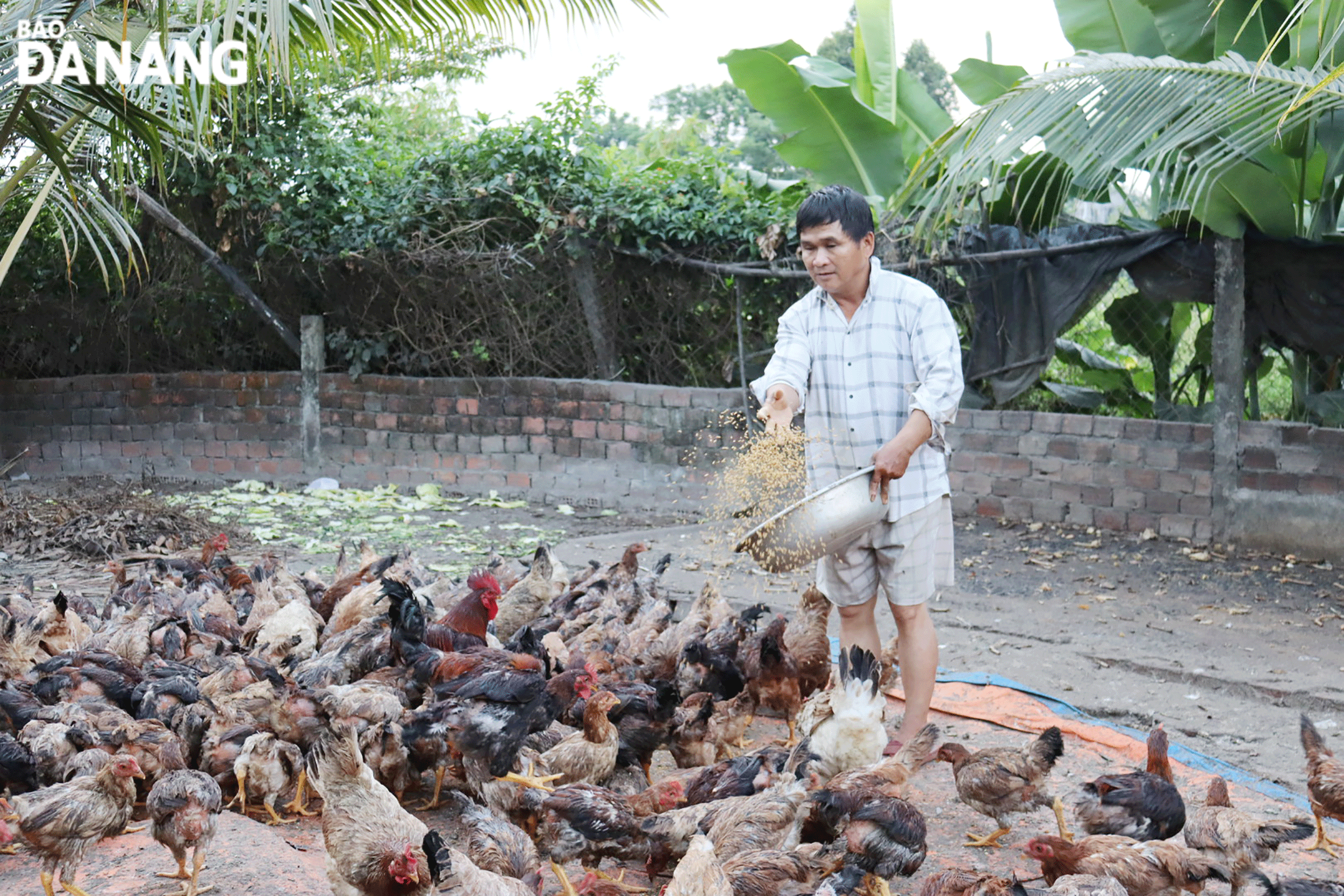Da Nang farmers actively restock livestock after Tet
Many livestock and poultry farmers across Da Nang are actively restocking their herds to maintain stable production and ensure a sufficient supply for the market. At the same time, they are paying close attention to disease prevention and control to safeguard their livestock.
 |
| Local farmers in Hoa Vang District are diligently caring for their poultry to ensure disease-free rearing conditions. Photo: HUU ANH |
During the Lunar New Year 2025 holiday, Mr Phan Nghia from Hoa Khuong Commune, Hoa Vang District, sold more than 50 pigs and 600 chickens. In the early months of the year, changing weather conditions pose a risk to livestock health, weakening their immune systems and making them susceptible to infectious diseases. To prevent outbreaks, he thoroughly disinfected his farm and left the pigsties empty for 3-5 days before introducing new livestock. Additionally, newly acquired animals were quarantined for 15-20 days before being integrated into the main herd.
After Tet, his six breeding sows gave birth to 70 piglets, ensuring high-quality stock. Simultaneously, he restocked his chicken farm with over 400 new birds, which are now thriving. “Closely monitoring the livestock allows for early detection of common illnesses and serious diseases. If left untreated, infections can spread rapidly and cause substantial losses. To maintain healthy livestock, I have stocked up on medicine and vaccines while ensuring proper nutrition and adequate water supply,” Mr Nghia shared.
Similarly, Mrs Nguyen Thi Xuan from Hoa Nhon Commune, Hoa Vang District, has been preparing for the new farming cycle by cleaning and disinfecting her pig pens. According to her, live pig prices currently range from VND 70,000 to 80,000 per kilogram, a high price that has remained stable since Tet, allowing farmers to earn an average profit of VND 1.5 to 2 million per pig. After selling 40 pigs during the holiday, she decided to expand her farm and plans to raise 60 pigs in the next cycle.
“My family’s livelihood depends entirely on livestock farming, so protecting our animals from unpredictable weather is a priority. I regularly disinfect the pigsties, spread lime powder at the entrances, and fumigate once a week to minimise disease risks. Pigs are prone to digestive issues, so I ensure that all feed is thoroughly cooked. I also incorporate agricultural by-products such as vegetables and fruits to improve economic efficiency,” Mrs Xuan explained.
At the Hoa Phong 1 Agricultural Service Cooperative, Hoa Phong Commune, Hoa Vang District, nearly 20 members have collectively restocked their farms with 2,500 chickens and 2,000 free-range ducks.
According to Mr. Nguyen Si, Director of the Cooperative, their Ke Son chickens, a three-star OCOP product of the city, are well-known for their high quality. Therefore, to maintain their reputation, they prioritise disease prevention and hygiene in livestock farming. He stated that all cooperative members had completed vaccinations and were supplementing their poultry's diet with vitamin C and electrolytes to enhance immunity. Additionally, he mentioned that they worked closely with relevant agencies to provide training and knowledge-sharing sessions on disease prevention and best farming practices.
Meanwhile, at the Thanh Khe Clean Agricultural Cooperative, Thanh Khe District, farmers have restocked over 80 pigs after Tet, bringing the total herd to more than 200 pigs. The cooperative sources its piglets from trusted breeding farms and ensures they are fully vaccinated.
Mr Tran Cong Minh, Head of the Cooperative, noted: "We prioritise clean, natural feed and limit the use of industrial feed. The pigs are raised for a longer period than usual, ensuring the best meat quality. The rising price of live pigs during Tet brought significant income for farmers. We hope the market remains stable throughout the year to sustain our livelihoods."
The District People's Committee has instructed communes to strengthen disease prevention efforts, ensuring safe and biosecure livestock farming. Authorities are also monitoring the sale, slaughter, transportation, and trade of livestock to guarantee food safety for consumers.
According to statistics, the city's total livestock population includes approximately 5,980 buffaloes and cattle, 27,231 pigs, and 577,524 poultry.
In 2024, animal diseases were effectively controlled, with no major outbreaks reported. In 2025, the agricultural sector aims to achieve high vaccination coverage, with at least 80% of all cattle vaccinated against foot-and-mouth disease and at least 80% of poultry vaccinated against avian influenza, including chickens, ducks, geese, and quails.
Reporting by HUU ANH - Translating by TRUC VY, PTRA








